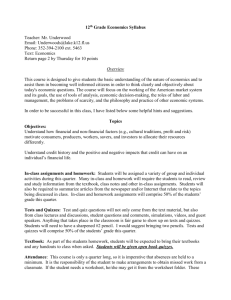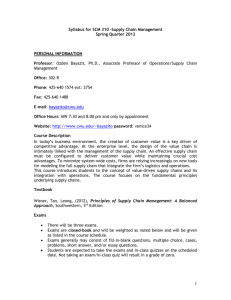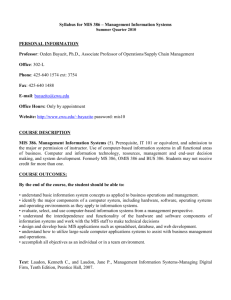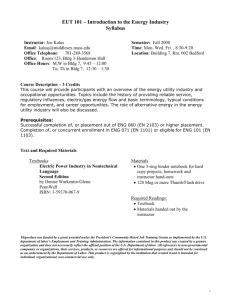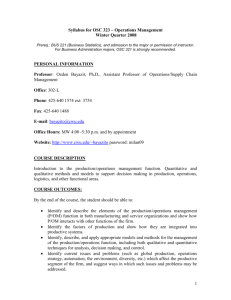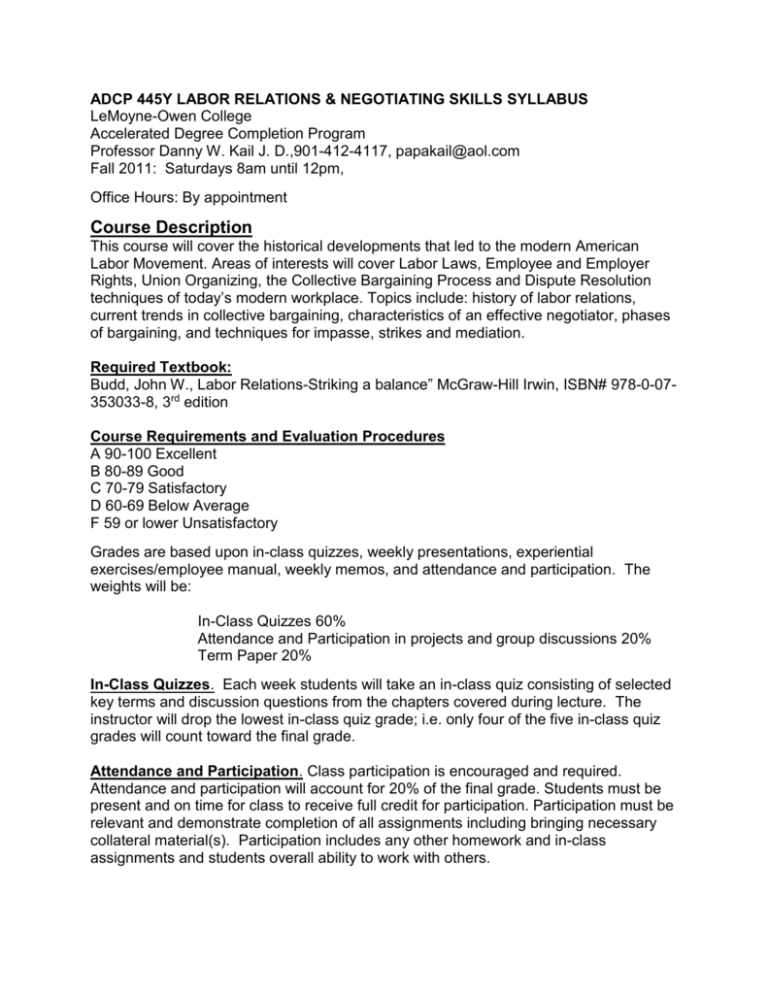
ADCP 445Y LABOR RELATIONS & NEGOTIATING SKILLS SYLLABUS
LeMoyne-Owen College
Accelerated Degree Completion Program
Professor Danny W. Kail J. D.,901-412-4117, papakail@aol.com
Fall 2011: Saturdays 8am until 12pm,
Office Hours: By appointment
Course Description
This course will cover the historical developments that led to the modern American
Labor Movement. Areas of interests will cover Labor Laws, Employee and Employer
Rights, Union Organizing, the Collective Bargaining Process and Dispute Resolution
techniques of today’s modern workplace. Topics include: history of labor relations,
current trends in collective bargaining, characteristics of an effective negotiator, phases
of bargaining, and techniques for impasse, strikes and mediation.
Required Textbook:
Budd, John W., Labor Relations-Striking a balance” McGraw-Hill Irwin, ISBN# 978-0-07353033-8, 3rd edition
Course Requirements and Evaluation Procedures
A 90-100 Excellent
B 80-89 Good
C 70-79 Satisfactory
D 60-69 Below Average
F 59 or lower Unsatisfactory
Grades are based upon in-class quizzes, weekly presentations, experiential
exercises/employee manual, weekly memos, and attendance and participation. The
weights will be:
In-Class Quizzes 60%
Attendance and Participation in projects and group discussions 20%
Term Paper 20%
In-Class Quizzes. Each week students will take an in-class quiz consisting of selected
key terms and discussion questions from the chapters covered during lecture. The
instructor will drop the lowest in-class quiz grade; i.e. only four of the five in-class quiz
grades will count toward the final grade.
Attendance and Participation. Class participation is encouraged and required.
Attendance and participation will account for 20% of the final grade. Students must be
present and on time for class to receive full credit for participation. Participation must be
relevant and demonstrate completion of all assignments including bringing necessary
collateral material(s). Participation includes any other homework and in-class
assignments and students overall ability to work with others.
2
Term Paper. Students will complete a 5-7 page term paper due the week the course
ends. During class meeting four, students will briefly discuss their topics. The term
paper topic should cover one of the areas discussed in class or a related topic to labor
relations and negotiation. Topics must be approved by the instructor by the third class.
The paper must be properly referenced and footnoted in accordance with college level
requirements.
The instructor reserves the right to make grade deductions, in accordance with college
policy, based upon the attendance (tardiness) and preparedness of the student. All
class sessions will require pre-class preparation in the form of reading assigned
passages, completing writing exercises, and/or Internet-based exercises. Each student
is required to have an e-mail address.
Attendance Policy:
Due to the accelerated nature of this course, there are no excused absences. Since
there are two sections of this course, students missing their assigned section class
meeting may attend the alternate section provided that notification of the absence has
been given to the instructor and the evening special coordinator. Students not able to
make up the missed class may receive a failing grade for the course. In such
circumstances, the student must notify the division chair. Each student will sign a class
roll during each class period.
Policies Related to Students with Disabilities:
Should a student with a disability be unable to complete the course requirements as
outlined by the instructor, an alternative procedure will be developed by the instructor in
consultation with the student.
Expectations:
Each student is expected to attend class for the full duration. There may be reasons,
which preclude attendance; however, this does not alter responsibilities for performing
in-class assignments and quizzes. If you are not able to attend class, you forfeit any
points for in-class assignments. Students are expected to read all assigned materials as
described. The syllabus will follow the general outline of the text and will correspond
with the assigned chapters; however, in-class emphasis will be placed on discussions of
broader concepts of assigned cases. Tardiness will result in a reduction of participation
credits.
Delivery of Written Assignments:
Written assignments are one of the primary means of communication in the business
program. As such, my evaluation of the success of your learning is entirely dependent
on your ability to express yourself through written assignments. All assignments should
be typed in letter quality print with one inch margins all around, and double-spaced.
Proofread your cases carefully for mechanics, spelling and clarity.
Written assignments are to be delivered to the Instructor at the beginning of class in
which the assignment is due. No late work will be accepted.
3
More Information:
For more background information on labor relations and labor unions, you may go to the
Microsoft Encarta website at www.encarta.msn.com to search for “labor relations” or
“labor unions.”
Labor Relations (is) broadly, all dealings, transactions, and activities affecting the
determination and enforcement of the terms and conditions of employment.
"Labor Relations," Microsoft® Encarta® Online Encyclopedia 2004
http://encarta.msn.com © 1997-2004 Microsoft Corporation. All Rights Reserved
(A) labor union (is an) association of workers that seeks to improve the economic
and social well-being of its members through group action. A labor union
represents its members in negotiations with an employer over all aspects of an
employment contract, including wages and working conditions. These contract
negotiations are known as collective bargaining. By giving workers a united
voice, a union can often negotiate higher wages, shorter hours, and better fringe
benefits (such as insurance and pension plans) than individual workers can
negotiate on their own. When an employer and a union cannot reach an
agreement through the collective bargaining process, the union may conduct a
strike (organized work stoppage). Or, an employer may prevent workers from
entering the workplace in a lockout.
"Labor Union," Microsoft® Encarta® Online Encyclopedia 2004
http://encarta.msn.com © 1997-2004 Microsoft Corporation. All Rights Reserved.
Class Schedule
Note: The instructor reserves the right to alter this schedule of class assignments and
meeting dates as circumstances may require. All changes will be announced in class
prior to their initiation and/or by e-mail. Note “complete” refers to a written
assignment that will be due while “read” or “review” refers to non-written
assignments for class discussion.
Before Class 1– Read Chapter 3, Historical Development
Class One: Discuss Chapter 3, Group Projects to be assigned, Quiz #1
Class Two – Read Chapter 4, Labor Law
Discuss Chapter 4, Group projects, Quiz #2
Class Three – Read Chapter 6, Union Organizing
Discuss chapter 6, Group projects, Submit Paper research topic, Quiz#3
Class Four: Read Chapter 7, Bargaining
Discuss chapter 7, Group projects, Quiz #4
Class Five – Read Chapter 8, Impasse, strikes and dispute resolution
Discuss chapter 8, Present research papers and answer questions from
the instructor, Quiz #5. Course completed



